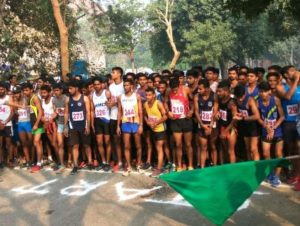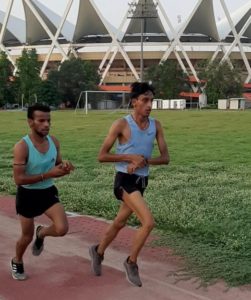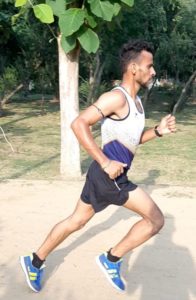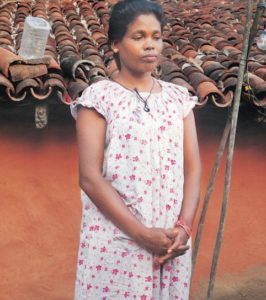National Sports Day: Young players’ race for funds, diet & livelihood

There are many young athletes in different parts of the country who have been training to participate at international events but find it hard to even manage their meals, let alone a proper sports training diet (Photo: Rahul Kumar)
As India celebrates the 115th birthday of the wizard of hockey Major Dhyan Chand as National Sports Day, thousands of sportspersons continue to suffer in silence and struggle to make ends meet. Even the Covid-19 pandemic and ensuring lockdowns has not affected them much as they claim to have seen the worst way before pandemic hit the rest of Indian population.
“Cricket is the only game that gets you recognition in India, even if you’re not a national level player. All other sports including hockey, athletics come nowhere close to cricket. Athletes win medals and bring glory to the nation throughout the year at different national and international events but don’t earn even half the money and fame that cricketers do,” says Dinesh Rawat, chief athletics coach at Delhi Athletic Association, told Media India Group.
The glamour, money and fame associated with cricket is unmatched in India. Even the national sport, hockey, has been entirely overshadowed by cricket for decades. Thanks to millions of followers on social media, even mediocre cricket players remain in the limelight even when not playing and receive constant adoration and earn millions of rupees, while the top players of other sports, including those with world rankings and world medals to show, live their lives in the shadow of cricket. Decades ago, in a prescient fashion, Major Dhayan Chand had predicted the poor standing of Indian sportspersons, not associated with cricket, years ago.
Known as ‘the wizard of Hockey’, Major Dhyan Chand, was born on August 29 in 1905. In an extraordinary career spanning over 40 years Dhyan Chand served as a national hockey player and later as the chief coach of hockey at National Institute of Sports (NIS) in Patiala, Punjab. He earned unparalleled fame and was conferred the Padma Bhushan, the third highest civilian award in India, in 1956.
In the last few years of his life, Dhyan Chand had mentioned the lack of proper funding and training for sportspersons in India on several occasions. He also showed serious concern for the future of hockey and other sports in the country during his term as coach at NIS. His words from half a century ago continue to ring louder than ever today as various sportspersons playing any other game than cricket, remain in shadows, trying to earn their daily bread.
There are many young athletes in different parts of the country who have been training to participate at international events but find it hard to even manage their meals, let alone a proper sports training diet. Others have won medals in past but fail to continue their sports due to lack of assistance from the government and the huge financial burden that comes with pursuing sports professionally as adequate diet, equipment and training is required.
On the occasion of National Sports Day, Media India Group talked to a few such athletes.
Rahul Kumar, athlete
Rahul Kumar, 23, belongs to Bulandshahr, Uttar Pradesh, about 100 km east of New Delhi. He came to the national capital nine years ago to earn some money that would help sustain his family. Kumar currently works as a worker at Delhi Milk Scheme. Kumar has been an athlete for past six years and is being coached by Rawat of Delhi Athletics Association. He has participated in and won podium finishes at more than 30 athletics tournaments, latest being the runner up in Delhi Marathon, 2019.
“My job requires me to work every night. During the day, I go to Jawaharlal Nehru (JLN) stadium for training. I barely get four hours of sleep on a daily basis. I cannot afford to pay for my prescribed diet. I earn INR 6,000 per month. In that amount I need to pay for my rent, essentials and transportation. I often go without two proper meals a day,” says Kumar.
Lack of support from the sports authorities and absence of sponsors further add to Kumar’s agony. He says “I have represented Delhi in athletics tournaments on more than five occasions within last two years but no one has sponsored me. Sports authorities pay no attention to our demands either. We do not receive any funds from the government.”
Despite his struggles, Kumar dreams of qualifying for the Olympic Games one day. “All I want is to represent India at the Olympics and win a medal. This is all I’ve been dreaming of since the day I started running. I’ll make my country proud and my mother would be so happy to watch me on the television,” Kumar adds.
Mohammah Meraj, athlete

Mohammad Meraj trains with Kumar and often works at construction sites to help his father (Photo: Mohammad Meraj)
Athletes require high quality running shoes to train and perform. While they sleep on an empty stomach several nights, buying a pair of shoes worth INR 4000-8000 is impossible for them. It leads to further problems in their training. “I suffered an injury last year because I didn’t have proper shoes. I can’t afford to buy new shoes for running. A few athletes, who train with me in the stadium, discard their old pair of shoes when they buy new ones. I ask for their discarded pair and wear them while running,” says Meraj Mohhamad, 22, is another athlete being coached by Rawat.
Mohammad’s father is specially-abled and works as a construction labourer. Very often, Mohammad also helps his father at construction sites. Just like Kumar, Mohammad also dreams of representing India at the Olympic Games one day.
Kumar and Mohammad are but two of the thousands of young sportspersons who struggle to make ends meet. Despite total lack of financial assistance and help from the government, they keep motivating themselves to keep up with their training and livelihood in general.
Situation for former players is no different than the young ones. Even after winning various international tournaments, sports authorities in India have failed to recognise their achievements. Some former players have turned to low earning jobs and several others are still struggling to find one.
Nauri Mundu, hockey player
Owing to financial issues, 40 year-old Nauri Mundu gave up the dream of being a hockey player nine years ago. Mundu, who’s from Jharkhand’s Khunti district, has represented the national team 19 times. Today, Mundu teaches in the Mahil School, a small private school near her house. Besides teaching, Mundu has also been forced to do farming because the INR 5,000 she earns from her teaching job is not enough to feed her family.
“I started my career in 1995, as a part of women’s hockey team in Nehru Hockey Tournament. I was honoured with the best hockey player award in the same year by former chief minister of Bihar, Lalu Prasad Yadav. I won a silver medal at National Women’s Games in 1996 and another at 43rd National Senior Games Championship in 1997,” Mundu recollects.
Mundu also mentions that medals remained only as showpieces on her wall as only a few weeks after the tournaments, her team struggled to find financial support. Even new hockey sticks and proper team jerseys became a luxury that most players in her team couldn’t afford. “My awards were forgotten by the media, my team stopped getting funds and often we would struggle even to find a field to practice. Sports authorities also didn’t help,” she says.
Mundu struggled for about 10 years, and then decided to quit hockey. Post that, Mundu worked as a labourer for few years and did farming on a small piece of rented land. Finally last year, she found a job as a teacher. “I wish I had the facilities that national cricket players get. I had to give up on my dream and so did most of the other girls in our team. This country didn’t recognise the dual struggle we go through as sportswomen coming from extremely poor families,” Mundu sums up.











